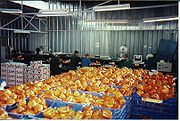.gif)
Paran (moshav)
Encyclopedia

Moshav
Moshav is a type of Israeli town or settlement, in particular a type of cooperative agricultural community of individual farms pioneered by the Labour Zionists during the second aliyah...
in the Arabah
Arabah
The Arabah , also known as Aravah, is a section of the Great Rift Valley running in a north-south orientation between the southern end of the Sea of Galilee down to the Dead Sea and continuing further south where it ends at the Gulf of Aqaba. It includes most of the border between Israel to the...
valley in southern Israel
Israel
The State of Israel is a parliamentary republic located in the Middle East, along the eastern shore of the Mediterranean Sea...
. Located around 100 km north of Eilat, it falls under the jurisdiction of Central Arava Regional Council
Central Arava Regional Council
The Central Arava Regional Council is a Regional Council in the South District of Israel.It encompasses 7 or 8 settlements near the eastern border of Israel, south of the Dead Sea...
. In 2009 it had a population of around 100 families.
History
The moshav is named after the Bible (Genesis 21:20-21): "And God was with the lad, and he grew, and dwelt in the wilderness, and became an archer. And he dwelt in the wilderness of Paran. And his mother took him a wife out of the land of Egypt."Economy
Each of the family farm units covers 50 dunams (50,000 m²). The main crops are high quality peppers and flowers for export. In addition, 14 of the families run a cowshed of 40-45 dairy cows each. Among the smaller farm branches are a date palm orchard and turkey production.Some families supplement their income with other activities such as a horseback riding school, a nursery for vegetable and flower seedlings, cottage industries producing arts and crafts articles, and jeep tours.
In 2008 new rules in Israel made solar power profitable.
Some families started to produce electricity (commercially) from 50 kWp photovoltaic power plants (per family), "enjoying" high Daily Solar Radiation and dry weather.

